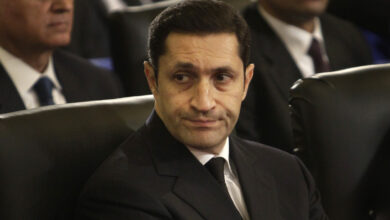Mohamed ElBaradei’s star is fading on the political and media scene. A staple for newspapers since his return, ElBaradei is now moving to the back burner, as are several opposition groups that support his calls for change.
This regression has coincided with Mubarak’s return to his pre-surgery level of activity. It seems as though Mubarak’s reappearance has been at the expense of the calls for change, especially after Mubarak warned of the current state of political mobilization degenerating into chaos.
Th Egyptian regime is still capable of stifling any call for change. Its inexorable desire to stay in power is stronger than the opposition’s belief in the necessity of change. The regime has proven that its success lies in its ability to persist and secure its grip on power. Meanwhile, it has failed to solve economic problems and to address the deterioration in the quality of health and educational services and has stood helpless as Egypt’s role in the Arab world and Africa has declined.
At the beginning, national newspapers showered ElBaradei with insults, then a handful of political parties–whose names are hardly recognizable–took a swipe at ElBaradei and the idea of change. They went so far as to accuse him of justifying the US invasion of Iraq. They even protested in front of his home and scenes from their protests featured prominently in state-run news media.
Then the government resorted to another technique aimed at undermining ElBaradei’s credibility. ElBaradei was bombarded with malicious questions regarding his position on controversial issues such as Bahaism and Article 2 of the constitution, which states that Islam represents the main source of legislation.
The government even started directing members of the National Democratic Party (NDP) to discuss change and reform in a fashion similar to that of the National Association for Change (NAC), founded by ElBaradei. Today, you can see senior government officials themselves criticizing the NDP, especially since the NDP has discovered that Egyptians enjoy hearing criticisms of the NDP.
The government has also worked on driving a wedge between members of the opposition. The government’s efforts in this regard have caused dissent among members of Kefaya and the NAC, with some of their members now saying that ElBaradie’s campaign is drawing on the power of foreign countries and inviting the US to interfere in Egypt’s internal affairs.
The government insists on keeping Article 2 of the constitution, despite its own affirmations of the civilian nature of the state, its refusal to legitimize religious parties and its keenness on changing religious curricula in line with the universal trends. Yet it doesn’t tolerate ElBaradei’s talk about the importance of US support for change in Egypt, even though many of the Egyptian regime’s decisions are intended to satisfy the US and–sometimes–even Israel.
The government seems to have temporarily abandoned the political scene during the period of Mubarak’s illness, knowing that, in the end, it will be able to suppress calls for change. It wants to send the message that such calls are futile. Even ElBaradei–a man with international clout who aroused the enthusiasm of the opposition and ordinary citizens–could not do anything.
If the regime has managed to secure its position all these years, that’s because it has neglected everything else to achieve this objective. But its success in the coming years will depend on how capable it is of absorbing the wrath of the people.
Translated from the Arabic Edition.




